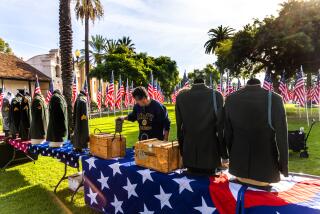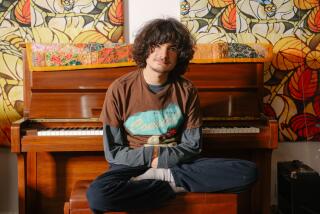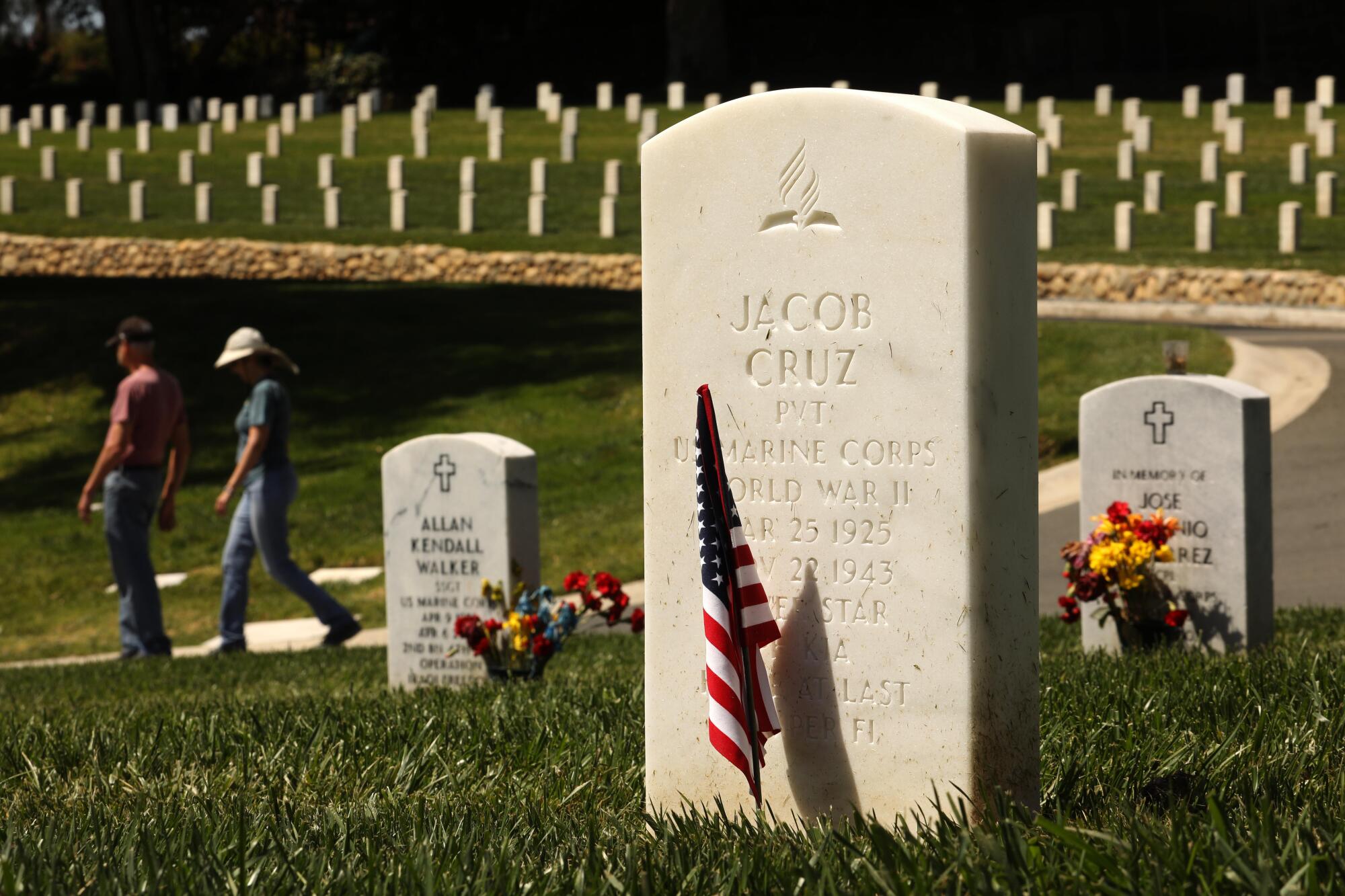
- Share via
The word came in the morning, as Grace Cruz and her children gathered at the family home in Boyle Heights on Christmas Eve, 1943.
Her oldest son, Jacob, was dead.
For the record:
9:31 a.m. April 16, 2021An earlier version of this column misidentified Grace Cruz in a photo caption. She is third from left, not fourth from left, in the photo of the 1954 Memorial Day ceremony.
The column misspelled the last name of Mike Mahan-Soto as Mahar-Soto.
The column also stated that the vans Jacob’s family rode in to his funeral were provided by History Flight. They were provided by Honoring Our Fallen.
A telegram from the United States Marines said the 18-year-old private was killed in action but divulged little else. The ongoing Pacific campaign meant Jacob would be buried in a temporary grave in the Tarawa atoll, where he and more than 1,000 other Marines and sailors died fighting the Imperial Japanese Army.
Weeks turned into months and into years. The military finally admitted it couldn’t find Jacob’s burial place. His name was etched at the Courts of the Missing at the National Memorial Cemetery of the Pacific in Hawaii.
Jacob’s family tried to honor him for the rest of their lives. Grace opened a diner named after him in Boyle Heights and kept his letters, newspaper clippings of his death and his medals — a Purple Heart and Silver Star, among others — in a cosmetics case. His four siblings shared stories of their brother with their own children, some of whom joined the military. Nephews who never knew their tío tattooed their arms and legs with his name and face and years of life.
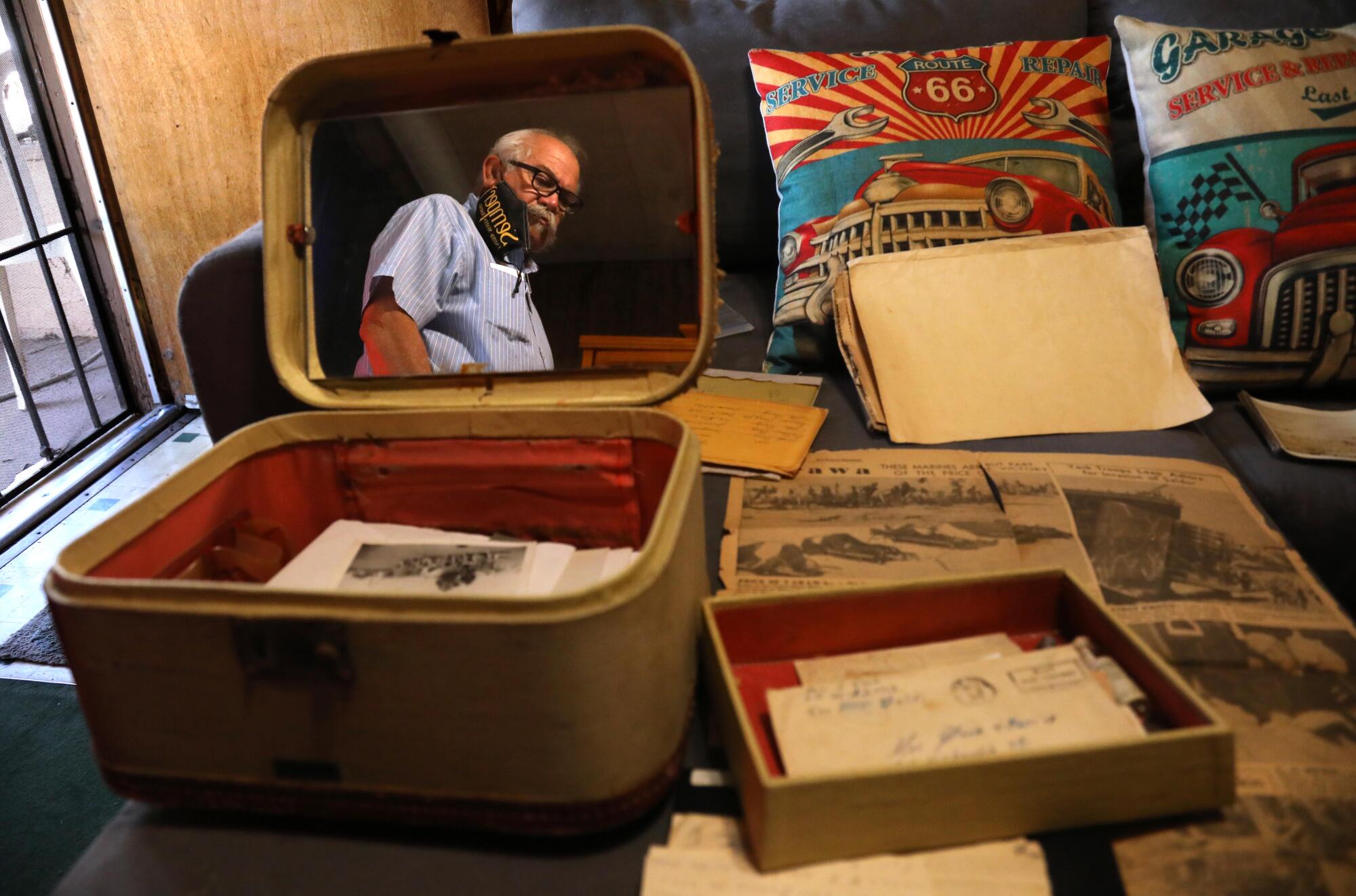
Grace died in 1974, and Jacob’s siblings followed until only two, Isaac Cruz Jr. and Ruth Soto, were left. Tears eventually dried, replaced by a longing for closure the family assumed would never come.
Then, in April of last year, Ruth’s daughter, Ruthie, received a phone call at work: Jacob was coming home.
The news was so impossible to believe that she hung up mid-conversation to gather herself.
Born in Arizona, Jacob Cruz moved to Boyle Heights with his family in the 1930s. As the oldest son, it was his job to help out his single mother, a Mexican immigrant who worked as a cleaning lady at White Memorial Medical Center. She had to give him permission to enlist since Jacob was only 17 and a junior at Roosevelt High School.
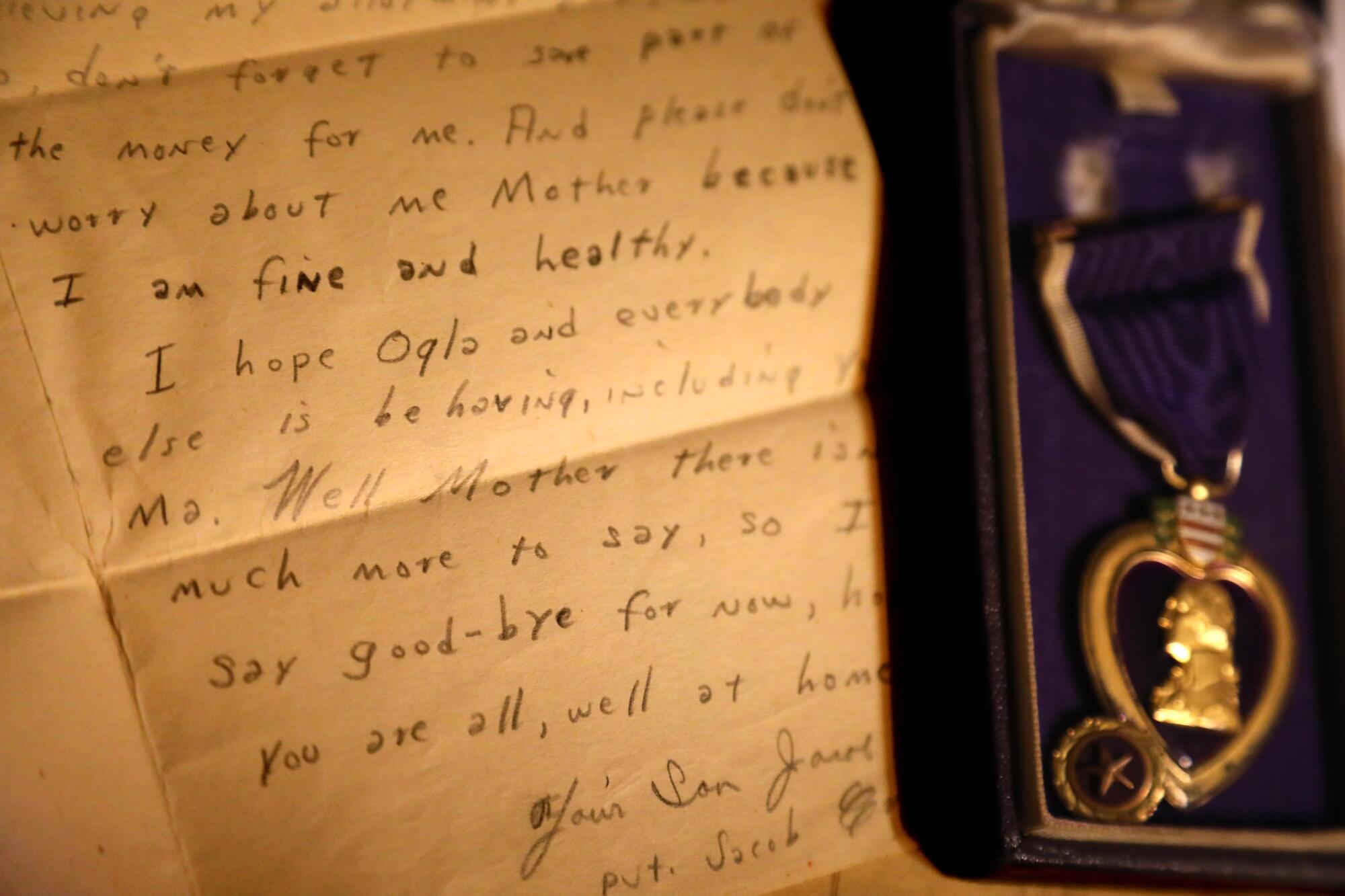
“She didn’t want him to sign,” Ruth said, “but he said, ‘I have to go to protect all of you.’”
He wrote dozens of letters while at infantry training at Camp Elliott in San Diego in 1943, all addressed to “Ma + Family” and usually signed “General Cruz.”
Jacob teased his oldest sister, Esther, about her love of hair dyes and asked for pictures of her newborn son. He asked his younger sister, Olga, to send him home-baked chocolate chip cookies. He threatened Isaac Jr. with a “kick in the Axis” if he didn’t stop bugging their sisters, and he told Ruth, “Don’t forget to write every day from now on.”
The teen was short — barely over 5 foot 6 — and lean, with a stern face that made him seem far older than his years.
“He was terrific,” said Ruth. “Just so responsible but loving. A happy-go-lucky guy.”
His last letter came on Oct. 29, just before Jacob’s division shipped off to the Pacific theater.
“Please don’t worry about me Mother, because I am fine and healthy,” he wrote. The last six words were bolded.
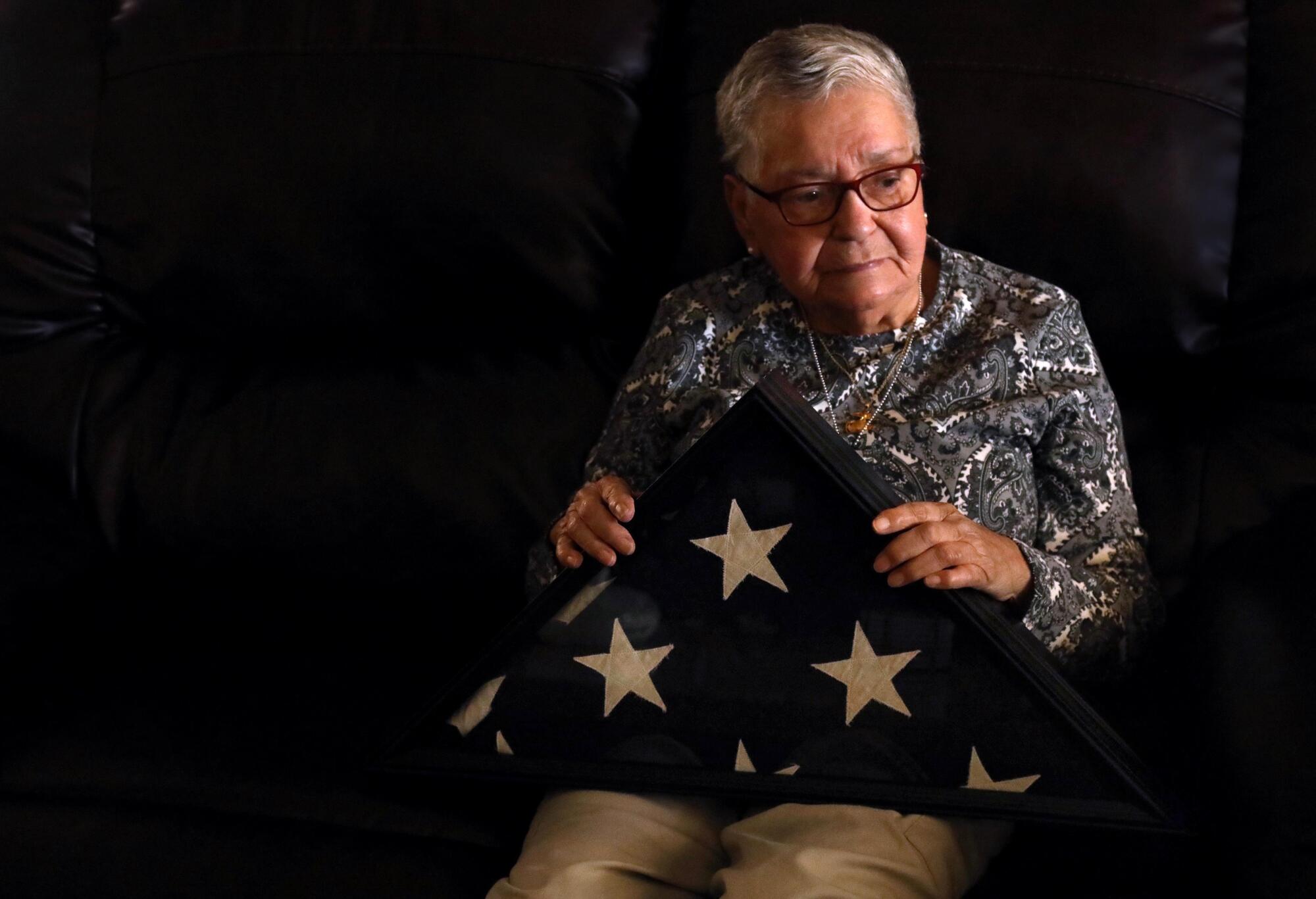
On Nov. 22, Jacob and his company found themselves under a heavy counterattack during the Battle of Tarawa. It was his first day of combat, and he ran ammunition boxes to gunners on the front line until two bullets struck him down, killing him instantly, according to a letter his sergeant sent to Grace months later.
The sergeant added this detail: The morning of his death, Jacob spent his down time under the shade of a coconut tree reading a Bible.
He and the other American casualties were buried in shallow graves with hastily built markers that Navy Seabees soon replaced with white crosses. A letter to the Cruz family said the military would try to retrieve his body “upon cessation of hostilities.”
But in the rush to win World War II, the locations of many graves were forgotten. An Army review board in charge of tracking down the bodies of fallen troops declared Jacob “non-recoverable” in 1949.
The news shattered his mother and siblings, said Alta Vargas, the daughter of Isaac Jr. — even more so because they had grown up without a man in the house.
“When they lost him, it was like they lost their father,” she said.
Grace regularly attended the Memorial Day service at the All Wars Memorial in Boyle Heights that honors the many Mexican Americans from the Eastside who have served in the military. She always made sure to take her grandchildren to learn about their uncle, said Mike Mahan-Soto, Ruth’s son.
“She’d go up onstage, and they’d give her a corsage,” said the 61-year-old Glendale resident. “Then she’d say a couple of words about my tío Jacob, about what a good boy he was.”
When Grace died, the cosmetics case with Jacob’s letters and other ephemera went to another grandson, Isaac III, Alta’s brother. He recently shared its contents at his home in Maywood.
“She always had a smile when she talked about my uncle,” said the 70-year-old as he opened the frayed box. “She was just happy to talk about him.”
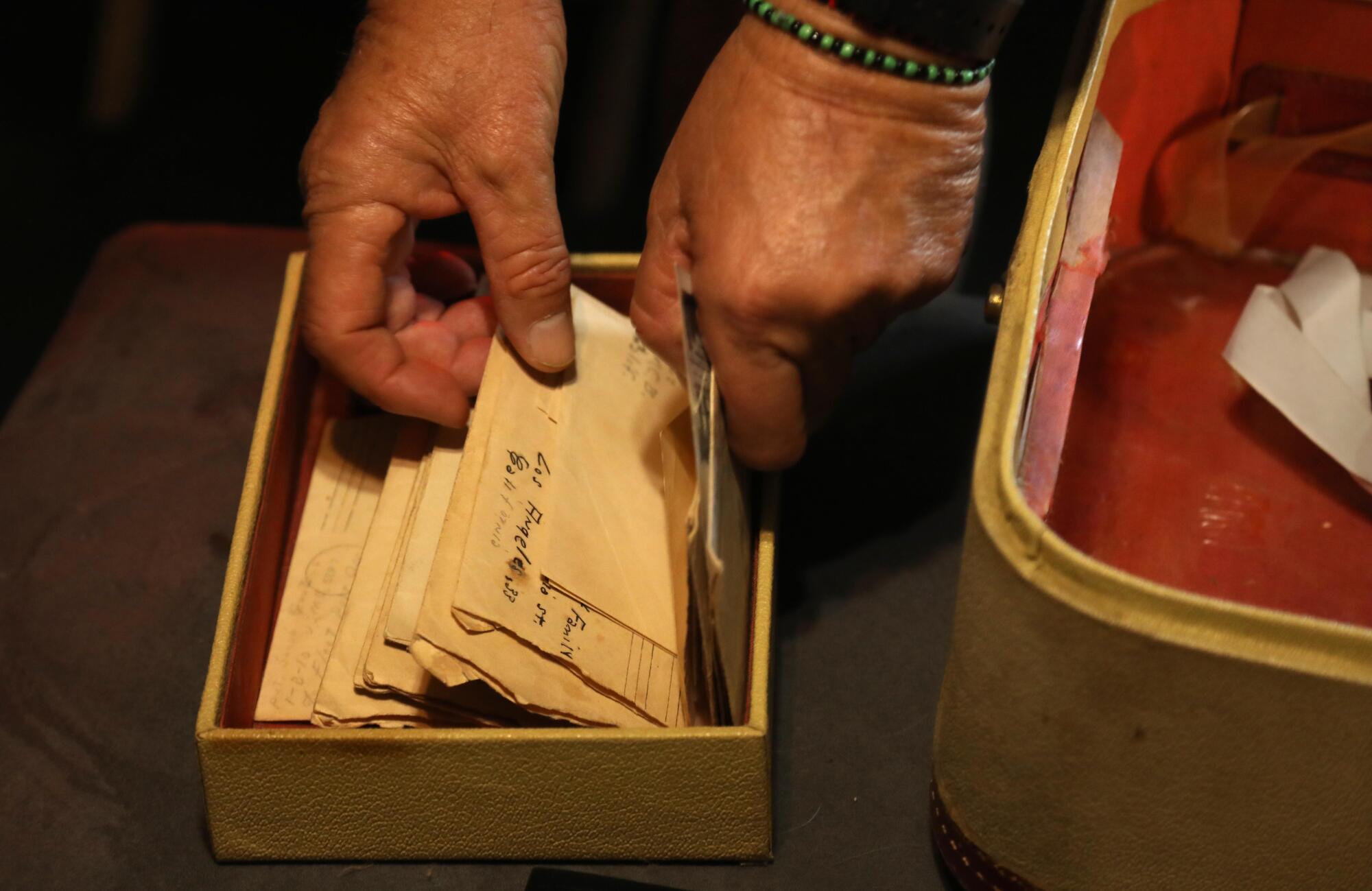
He carefully unfolded yellowed newspaper clippings and took out his uncle’s letters from brittle envelopes. Preserved in plastic slips was the original telegram — “DEEPLY REGRET TO INFORM YOU...” — announcing Jacob’s death, along with condolence messages from Marine officials, Roosevelt High’s principal and Los Angeles Mayor Fletcher Bowron.
A certificate signed by President Franklin D. Roosevelt assured Grace and her children that Jacob continued to live “in a way that humbles the undertakings of most men.”
The lofty words were right, in a sense. He turned from son to brother to legend to myth with each passing generation.
“My dad would tell us that my uncle was a hero, but we just never realized the extent of it,” said Alta, 66. She envisioned visiting Tarawa, but the logistics were too hard. “We were just little kids and would just think, ‘Oh yeah, our uncle. So sad that he died at such a young age.’”
“I know he was good,” said Isaac III. “He took care of everybody. He was already a man by the time he died.”
As for Jacob’s two surviving siblings, their memories of him were warm, if vague.
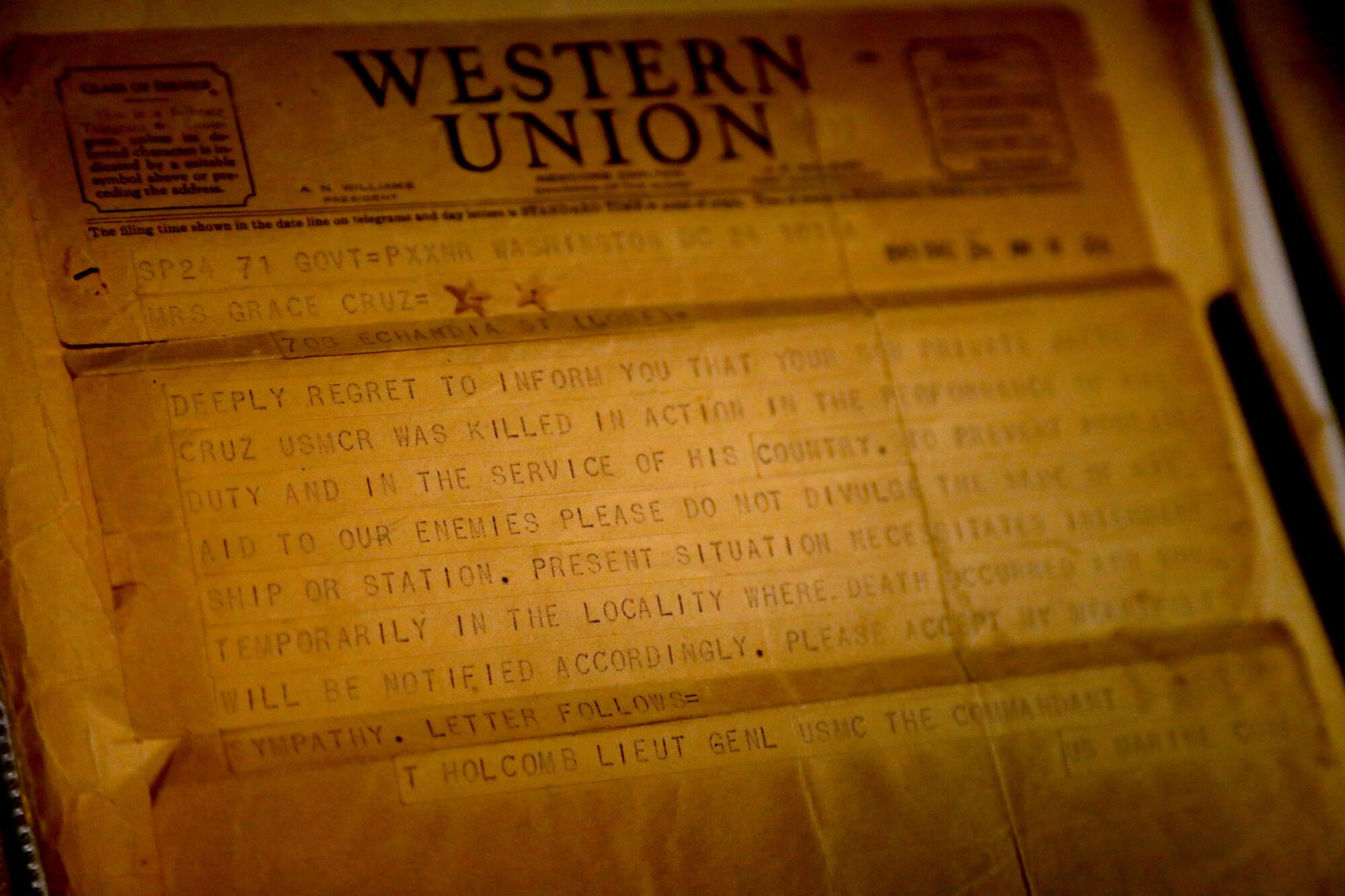
Ruth talked to Jacob on the phone before he shipped out but can’t recall the conversation or much about her brother. She was only 11 when he died and admits her memories mostly begin after that painful day.
Isaac Jr., who was 14 at the time, had more stories: How the two of them walked along train tracks looking for iron scraps to sell and make money for their mom. Jacob’s love of sports, especially baseball and football. The time he tried to go steady with a Russian girl, but her parents didn’t approve because Jacob was Mexican.
During basic training, Ruth recalled, “he’d come back on the weekends from camp with his dirty clothes.”
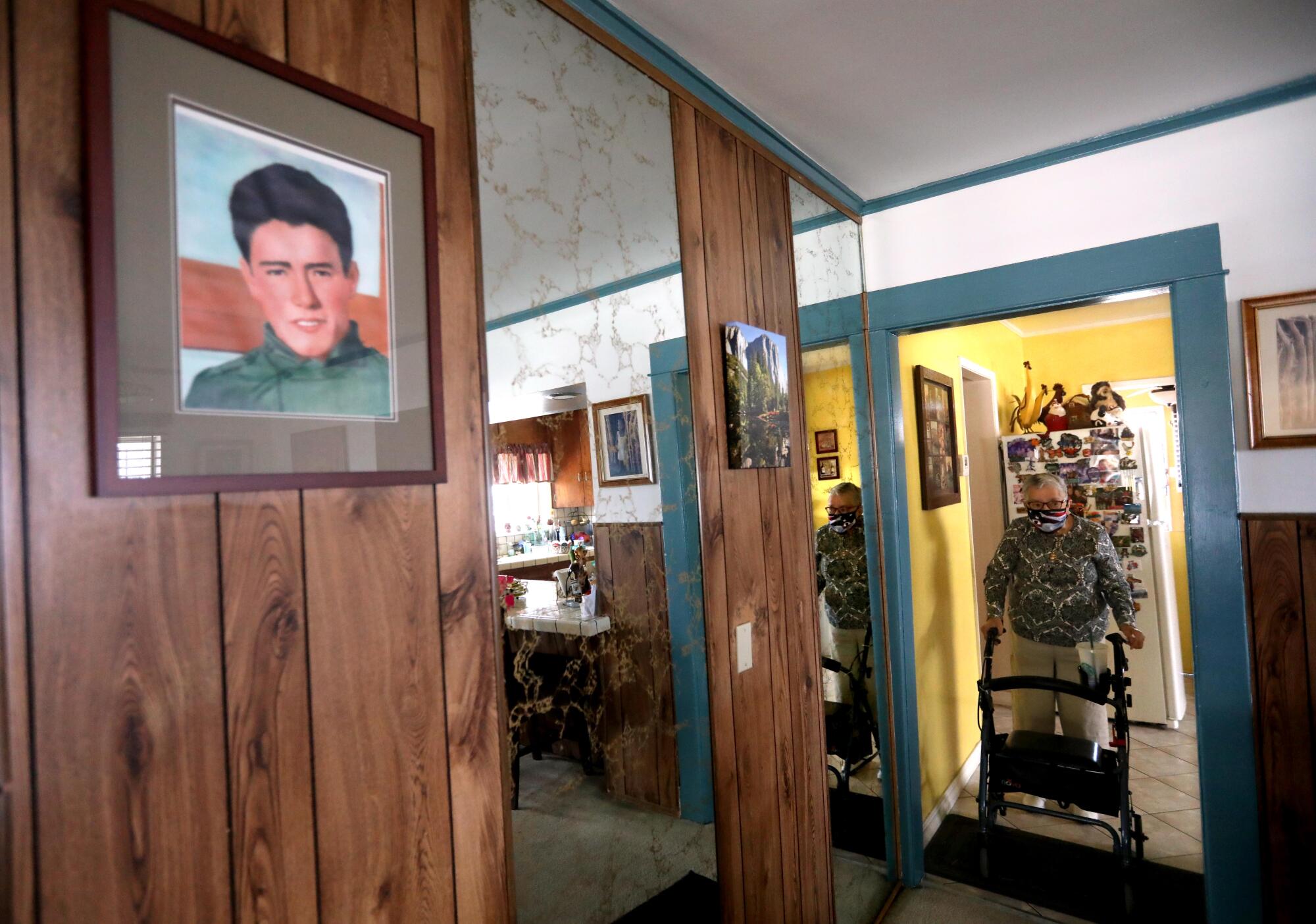
Now 88 and living in Glendale, she wore dog tags with a photo of Jacob in uniform. A fabric painting of him hung in the dining room. A display case with copies of his medals and citations stood on an end table.
“Jacob had a job for everyone except me, because I was the baby,” she said. “I never forgot him.”
Neither had the military.
Advancements in DNA and forensic technology have allowed the military and private groups to identify remains and return them to families across the country. In 2009, Isaac Jr. and Ruth donated DNA samples at the request of military officials.
For decades, investigators had sought the plot where Jacob was buried.
Known as Row D, it became “lost in the scheme of everything,” said Jordan Windish, an osteoarchaeologist with History Flight, a Virginia-based nonprofit devoted to finding and repatriating missing American servicemembers.
Windish and her colleagues suspected Row D was under a house built in the 1950s in Tarawa, now part of the Republic of Kiribati. For a decade, the local housing commission declined their requests to search underneath its concrete foundation.
A storm destroyed the house in 2019, and the commission finally let History Flight dig.
They unearthed 32 servicemembers, including Jacob. He still had his boots on. His remains were shipped to a military laboratory in Hawaii on the Fourth of July.
Scientists with the Defense POW/MIA Accounting Agency identified Jacob through dental records and the DNA that Isaac Jr. and Ruth had donated a decade earlier.
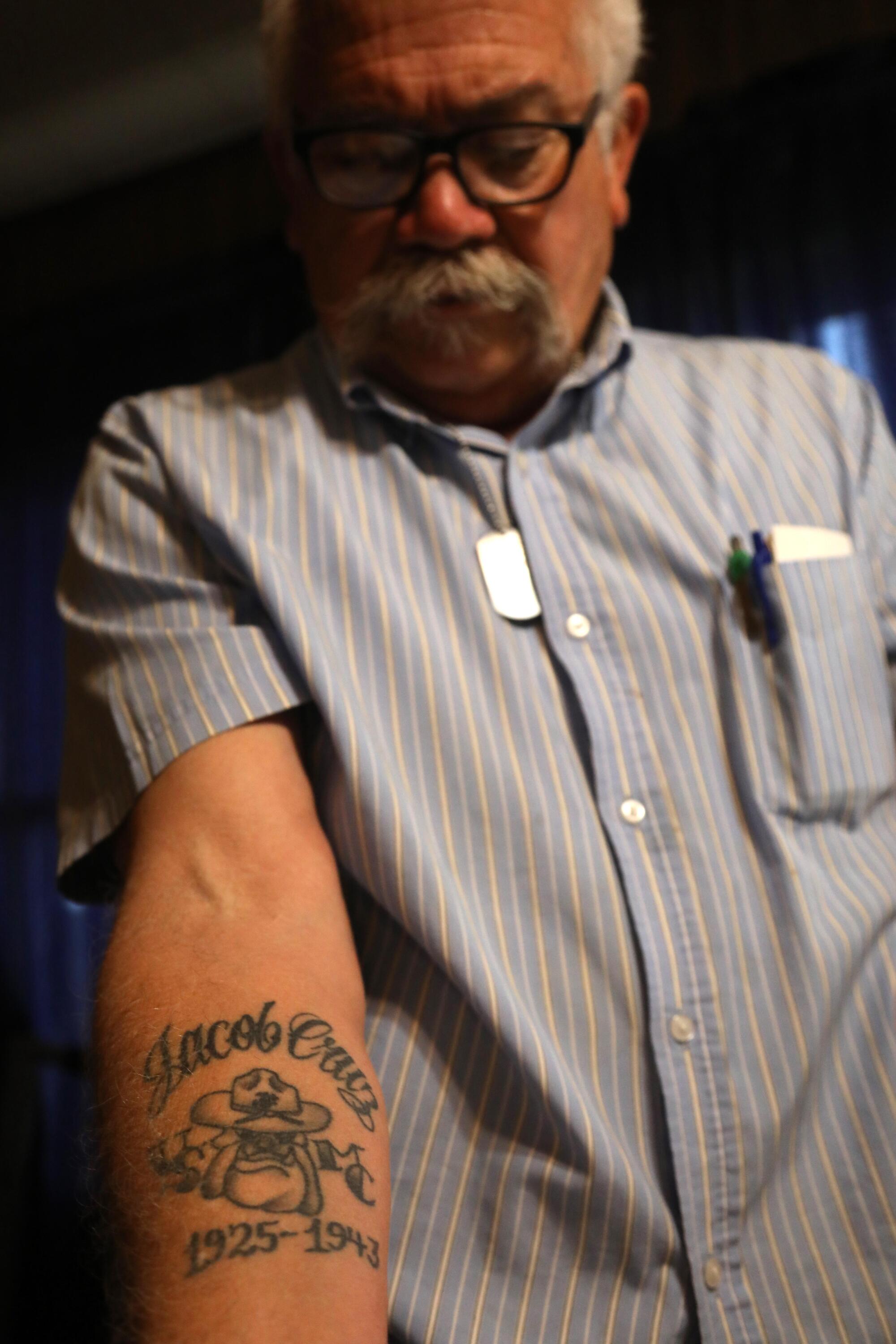
Ruth confessed she “always had hope that he was alive somewhere,” so when her daughter, Ruthie, told her the news last April, she couldn’t believe, even decades later, that Jacob truly was found.
“I thought that it was a dream,” she said, “and I’d wake up, and [his body] wasn’t there.” Her voice cracked as tears welled in her eyes. “Seventy-seven years is a long time.”
Because of COVID-19 restrictions, the Cruz family delayed Jacob’s return until November. The winter surge convinced Isaac Jr. to delay just a couple of months more.
On March 24 at the Los Angeles International Airport, a contingent of Marines, Los Angeles police officers and airport workers stood silently alongside the Cruz family as the flag-draped casket descended from an airplane.
Mike pushed his mother in a wheelchair so she could be the first to welcome back Jacob. She gently touched the casket with her hand.
“To have a sibling that still remembers one of these soldiers is rare,” said Windish, who accompanied the family that day. “Ruth was holding my hand and looking into my soul. She kept saying, ‘Thank you so much for bringing my brother back.’”
Jacob’s hearse traveled to Guerra & Gutierrez Mortuary in East Los Angeles with an escort provided by Patriot Guard Riders. Law enforcement and firefighters saluted from overpasses on the 105 Freeway. The motorcade drove by Plaza Mexico in Lynwood, where a giant marquee flashed Jacob’s photo with the words “A Hero Remembered Never Dies.”
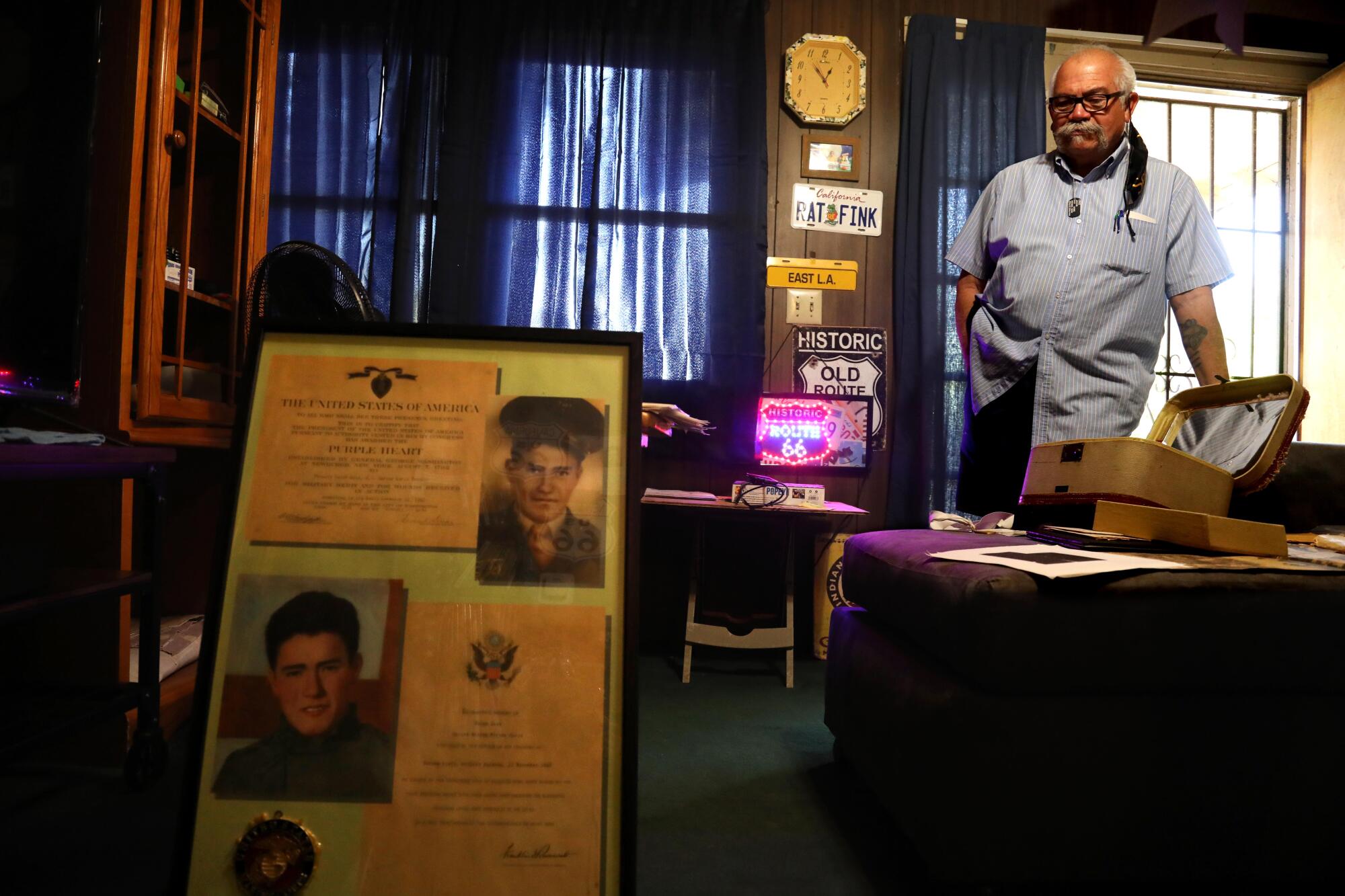
The following day, Jacob’s family packed into vans provided by Honoring Our Fallen, a group dedicated to helping the families of military members who died in combat, for his funeral at Los Angeles National Cemetery in Westwood. Cousins who hadn’t spoken in at least 20 years sat next to one another. Now, they talked nonstop about their uncle Jacob.
“It was kind of shocking to see how affected everybody was,” Mike said. “Not that I thought others didn’t care. I just didn’t know how large my uncle loomed in these various households.”
It was Jacob’s birthday — he would have turned 96 that day.
He received a three-volley salute and a helicopter flyover. A niece sang the gospel classic “His Eye is on the Sparrow.”
When she hit the final line — “ I know he watches over me” — a wind blew over the wreaths near the grave.
Jacob’s sister, nieces, nephews and their children grieved doubly that day.
The week before, Isaac Jr. had died of complications from a fall at his home in Boyle Heights. He was 91.
One of his last outings had been walking into Guerra & Gutierrez without an appointment to arrange a wake for his brother.
More to Read
Sign up for Essential California
The most important California stories and recommendations in your inbox every morning.
You may occasionally receive promotional content from the Los Angeles Times.

